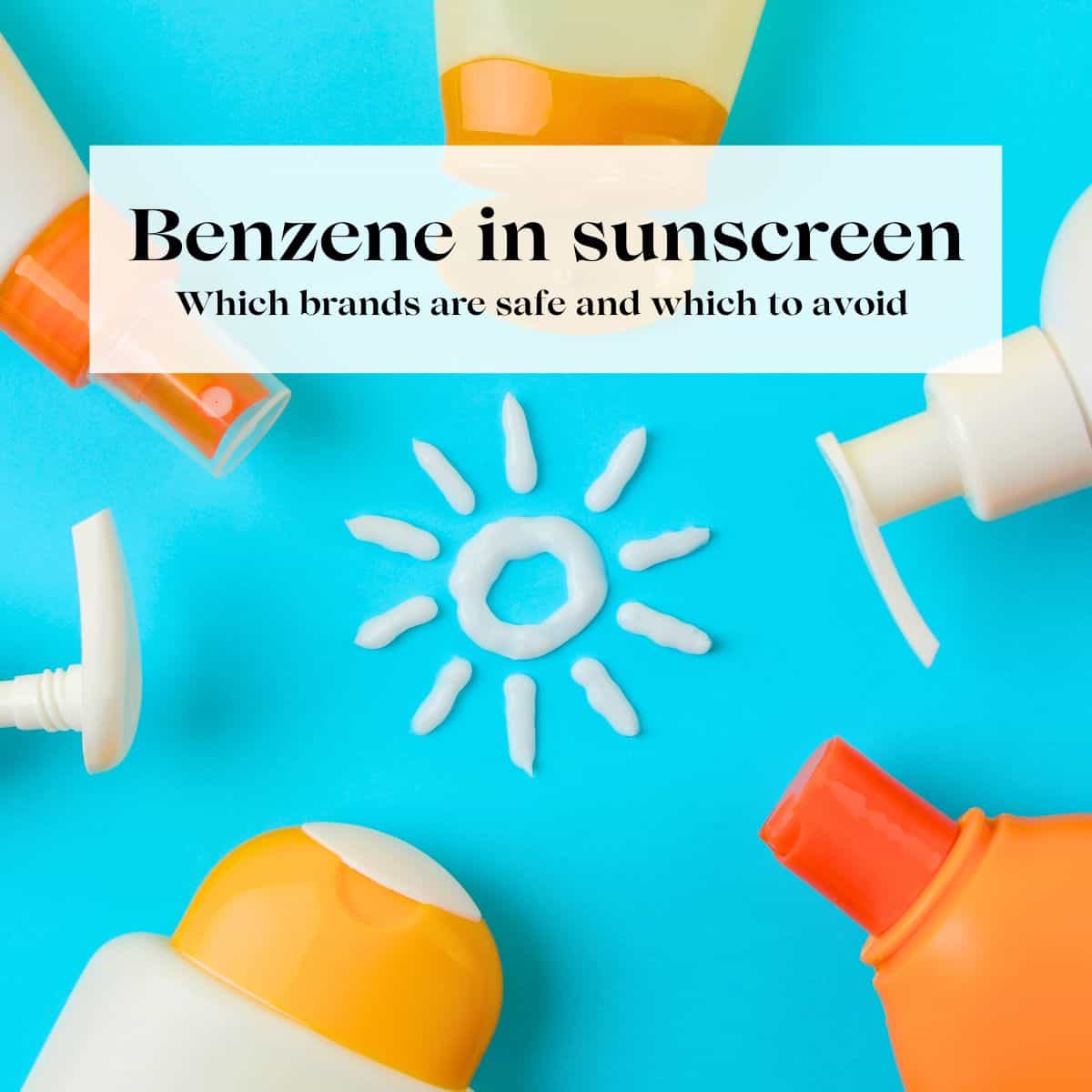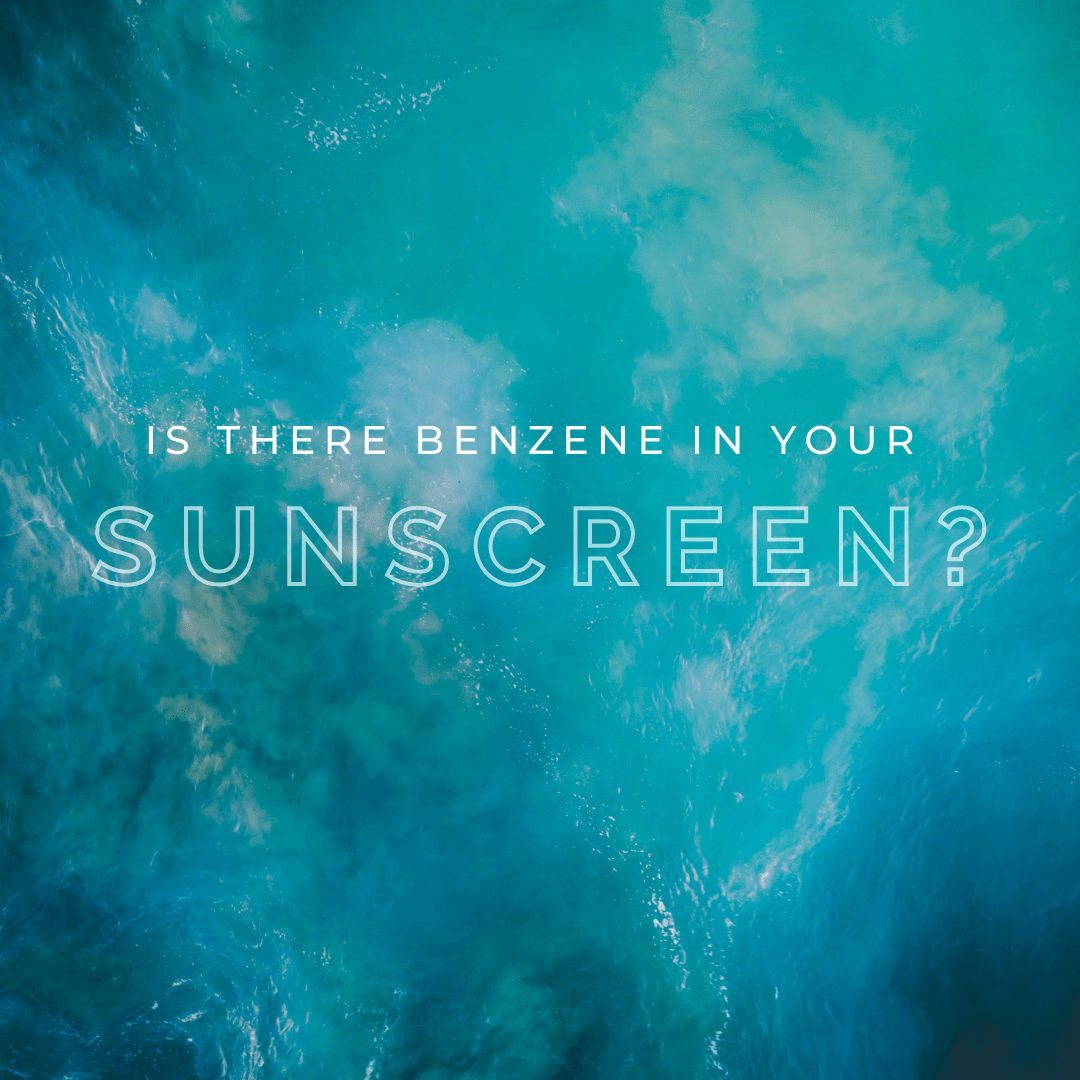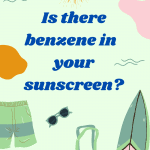A recent investigation found benzene in sunscreens from many different brands. This is concerning because benzene is a known carcinogen with many potential negative health effects. This review discusses the health effects of benzene, how it ends up in sunscreen, which brands were found to have benzene in their sunscreen and how you can avoid it.

Benzene in Sunscreen Review
Is there benzene in the sunscreen you are using? There might be! Scary right? A recent report found benzene in 78 different sunscreens and after-sun products. This is concerning because benzene is a known carcinogen. And because of its potential health effects, should not be in sunscreens, or any personal care products for that matter. Before we review the report that found benzene in sunscreen, let's first do a review of what benzene is, its health risks, and how it could end up in sunscreen in the first place.
Table of Contents
- Benzene in Sunscreen Review
- What is benzene?
- Benzene health risks
- Benzene in sunscreen
- How does benzene end up in sunscreen?
- How do you know if there is benzene in the sunscreen you are using?
- How to avoid benzene in your sunscreen:
- How you can help get benzene removed from sunscreen:
- Frequently asked questions:
- Other health information you will want to read:
- Our expertise:
What is benzene?
Benzene is a chemical. More specifically it's a liquid hydrocarbon. Benzene is commonly found in petroleum, cigarette smoke and coal tar and it is also used as a solvent in a wide range of products and industries.
It is known that workers from many different industries including petroleum, rubber, paint, shoe making, printing, solvent and other chemical industries are occupationally exposed to benzene on a regular basis. The major sources of environmental exposures to benzene include cigarette smoke (both from smoking and second hand smoke), auto exhaust and driving or riding in automobiles.
Benzene health risks
Benzene is known to be toxic to health. And more specifically it is a known carcinogen. The toxicity of benzene has been know for over 100 years. Benzene is known to cause cancer in humans and has been classified as a carcinogen by many different organizations including the U.S. Centers for Disease Control and Prevention, the U.S. Department of Health and Human Services, the World Health Organization, and other regulatory agencies and bodies.
The National Institute for Occupational Safety and Health defines benzene as a carcinogen and lists “inhalation, skin absorption, ingestion, skin and/or eye contact” as potential routes of exposure.
Excessive exposure to benzene is known to damage the bone marrow. Resulting in decreases in the numbers of circulating blood cells. Which can ultimately lead to a condition called aplastic anemia. Even more concerning is that exposure to benzene is known to cause one or more types of leukemia (a type of blood cancer) in humans.
In animals, benzene is known to cause cancer in many different organs. It has been shown that in animals, exposure to benzene either by inhalation or ingestion, produces cancer of the oral cavity, nasal cavities, skin, stomach, mammary glands, lungs and liver. Animals studies also show benzene to have reproductive toxicity leading to decreased birth rates, retard skeletal development and lead to spontaneous abortions.
Because of its toxic properties, the FDA has banned the intentional use of the chemical in commercial products. However, there is an important exception to this rule: the FDA does allow benzene-containing products to be sold if the product provides a "substantial therapeutic advance," provided that levels in the product are at or below 2% and introducing benzene into the product is unavoidable.
Sadly, this is not the first time where harmful chemicals are given an exception by the FDA (remember my post Is There Mercury In Your Mascara?). As well, the FDA currently has no rules or restrictions regarding the use of benzene in sunscreen products.
Benzene in sunscreen
Valisure LLC, an online pharmacy company that also conducts independent testing of consumer products, recently tested almost 300 different sunscreens and after sun products (294 products to be exact) made by 69 different companies and found benzene in 78 of these products.
Valisure also noted that some of the sunscreens they tested had levels of benzene that were higher than the 2% limit mandated by the FDA. They also note that because most of the products they tested did not have any detectable amounts of benzene it clearly is not an unavoidable byproduct of production, and therefore does not need to be in sunscreens at all.
Because of this, Valisure has issued a petition to the FDA asking it to enact stricter rules regarding the presence of benzene in sunscreen products. Valisure is asking the FDA to ban any amount of benzene in sunscreen and after-sun products. And to issue a recall for those that have measurable levels of benzene that have already been sold or are currently being sold.
Benzene in sunscreen is especially concerning as there have been multiple studies showing that chemicals in sunscreen products are found in the blood at high levels after application to the skin. In other words, the chemicals in the sunscreen are not just sitting on the surface of your skin. They are getting absorbed into your bloodstream. Hence you want to be sure that you are avoiding harmful chemicals in the sunscreen you are using. Including, but not limited to avoiding benzene.
How does benzene end up in sunscreen?
Benzene can get into sunscreen in two ways:
First would be intentionally through the addition of this chemical into the sunscreen itself.
The second way, and the more common way, is through contamination. The issue is usually contamination with benzene from the extraction methods used to obtain the raw materials for making the sunscreen. Benzene can be used as a solvent to help extract the ingredients. And then ends up in the sunscreen as a by-product of this extraction technique.
Right now the FDA doesn't require companies to test for contaminants in skincare products. So the brand you are using may not even be aware of the benzene in their products. Contaminants also don't have to be listed on product labels, so even if there is benzene in the sunscreen you are using it won't be listed in the ingredients.

How do you know if there is benzene in the sunscreen you are using?
If you're wondering if there is sunscreen in the one you are using I highly recommend reading the Valisure report to see the full list.
Many of the sunscreens found to contain benzene are from some of the most popular brands. Including brands that are often recommended by doctors including but not limited to Neutrogena, Sun Bum, Raw Elements, CVS Health, Banana Boat, EltaMD, Babyganics, Coppertone, Walgreens, Ethical Zinc, Max Block, La Roche Posay, Aveeno and more.
The sunscreens found to have benzene in them were both chemical and mineral sunscreens. So unfortunately choosing a mineral sunscreen doesn't guarantee its safety. If you aren't familiar with the difference between mineral and chemical sunscreens I highly recommend reading this review.
How to avoid benzene in your sunscreen:
As we've just reviewed, there is currently no FDA regulation regarding the use of benzene in sunscreen products so right now it's up to you do do your own research. The Valisure list of sunscreens that tested negative for benzene is a great place to start, but of course they were not able to test every brand of sunscreen on the market.
The other way you can ensure the sunscreen you are using is benzene free and free of other harmful ingredients is to choose a brand that tests their sunscreen for contaminants. I don't know of many brands that do this. But you can read about my personal favourite brand of sunscreen which does test all their batches of sunscreen for contaminants to ensure that harmful chemicals like benzene don't end up in their products.
How you can help get benzene removed from sunscreen:
Please fill out the Valisure petition to the FDA to help get benzene banned in sunscreen. Every voice matters! As well, if the sunscreen you are using is one of the ones found to contain benzene, make sure you write to or contact the brand. They need to hear from consumers! If enough people tell a brand that they won't buy their product because of this issue they will be forced to listen and change their manufacturing processes. We need all brands to be checking their products for contaminants to ensure they are safe for our health.
I hope you found this review helpful. If you have any questions please leave them in the comments.
Frequently asked questions:
No it's not. These are two different chemicals. Oxybenzone is one of the chemicals that is intentionally put into sunscreen as a chemical sun block. You can learn more about oxybenzone in my review How to Choose a Safe Sunscreen.
When shopping for sunscreen, to ensure it's safe for your health you want to stick to mineral sunscreens, and you want to avoid parabens, phthalates, fragrances and chemical sunscreen ingredients such as oxybenzone.
I hope you found this review helpful. If you have other questions please let me know.
Other health information you will want to read:
- How to choose a safe sunscreen
- Is mineral or chemical sunscreen better?
- Is there mercury in your mascara?
- How to choose non-toxic cookware
Our expertise:
Dr. Erin Carter, MD, FRCPC, is a physician with board certifications in internal medicine and rheumatology. She is passionate about nutrition, environmental health and low toxicity living and has been doing research and publishing information in this area for years. She is also a self-trained chef and has been creating and publishing recipes since 2015. Her recipes have been featured on many different websites and online publications.


Leave a Reply